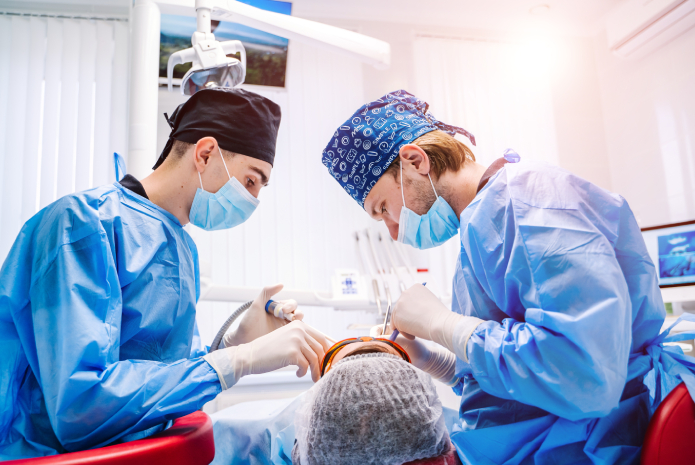“Clinical trends aimed at long-term success in implant therapy and peri-implant health” is a pioneering and innovative initiative by SEPA and Ticare based on a prospective study that will provide consensus answers on clinically relevant and controversial aspects that do not count at the moment. with solid scientific evidence.
To successfully face the challenges that arise in the prevention and management of peri-implant diseases, it is necessary and urgent to respond to the growing unknowns that remain or constantly emerge in this area. Having adequate knowledge and the joint assessment of relevant experts on these topics provides essential bases for progress and advancement. These are the main premises that underpin an ambitious scientific and clinical project..
The doctors Alberto Monje and Ana Molina are the scientific coordinators of this initiative, which is the result of an agreement between two institutions that They lead research and dissemination of knowledge in the field of peri-implant health. Thus, SEPA and Ticare reinforce their strategic collaboration with a wide-ranging projectframed within the SEPA Implants and Peri-implant Health Knowledge Community.
“The project arises from the need to know factors that have not yet been explored or that do not have sufficient scientific evidence but that, however, are of special interest,”
Dr. Alberto Monje
“Under the title «Clinical trends aimed at long-term success in implant therapy and peri-implant health», it starts «a pioneering and innovative initiativein accordance with the values of rigor and excellence that characterize SEPA, and the result of the commitment to research and scientific dissemination of Ticare, a leading Spanish company in the manufacture of implants and the promotion of peri-implant health,” explain the promoters of the project.
Promote research into factors not yet explored
Approximately 20% of patients suffer from peri-implantitisa pathological alteration that compromises the stability and aesthetics of dental implants and the correct functionality of the patient. In current implant therapy the results desired by clinicians have transcended the achievement of achieving long-term survival. What until very recently could be considered success, defined by relative stability characterized by the progressive loss of peri-implant support, It is currently defined as pathology«.
“The project arises from the need to know factors not yet explored or that do not have sufficient scientific evidence but thatHowever, they are of special interest,” explains Dr. Alberto Monje. This is an innovative and outstanding attempt to better understand the current status of many significant clinical trends”, adds Dr. Monje, “based on the knowledge and experience of highly qualified and reference clinical professionals. The purpose is advance clinically and encourage research on aspects that are not yet resolved or have very limited evidencebut they are key in the approach to the prevention and treatment of peri-implant pathologies.”
The “Clinical Trends” project is articulated through a prospective study based on the Delphi methodologyqualitative research technique focused on the identification of predictive consensus among a group of experts. As a starting point The existing scientific evidence and clinical perception by the group of experts will be collected.. This study aims to serve as a joint and consensual reflection on burning, controversial issues of enormous present and future clinical interest, all with the ultimate purpose of optimize implant therapy.
A young and highly qualified scientific committee
40 professionals under 40 years of age have been selected to be part of the panel of expertstaking into account their training, career, proven experience and knowledge. Among other tasks to be carried out, the members of the Scientific Committee will participate in meetings held prior to the consensus meeting, debating topics such as methodological design, the definition of the research object and the existing scientific evidence.
The experts will deal with the identification of the approaches or factors that determine the long-term success of implant therapy and the integration into the project of the indications formulated by the Advisory Committee of Senior Experts. In addition, they will attend in person the consensus meeting that will take place from January 26 to 28, 2025 at the Monastery of Valbuena (Valladolid)taking part in different plenary sessions and specific working groups, in order to validate the final report, which will be published in an impact journal.
“The purpose is to advance clinically and encourage research on aspects that are not yet resolved or that have very limited evidence,” DR. ALBERTO Monje
For Dr. Monje, there is no doubt that “This is a much-needed initiative.”. The novel nature of this event, in his opinion, “not only lies in bringing together in the same forum a significant number of very outstanding and prominent scientists and clinicians in the field of implant therapy, but also young experts. , all of them under 40 years old, who are part of the generations that will assume leadership in the coming years.”
“This youth, combined with the already extensive experience and qualification of the experts, will allow you to obtain a more current, talented and rejuvenating vision about those factors that are going to play a fundamental role in the prevention of peri-implant pathologies in the next 20-30 years”, assures the scientific coordinator, who emphasizes that “the experts are carefully selected, both for their knowledge and experience, as well as for its geographical distribution throughout Spain and with a wide representation of all the disciplines involved in the approach to peri-implant diseases. This very heterogeneous profile will undoubtedly enrich the result of the meeting and the study that is generated.”.
“The fact of evaluating current and future trends, and determining those key factors to prevent peri-implant pathologies, is of special interest to scientists, researchers, clinicians and also to the dental industry. All of them can benefit greatly from the conclusions drawn, giving clues about where to put the focus of attention to provide greater predictability and effectiveness to implant therapy”, concludes Dr. Alberto Monje.
